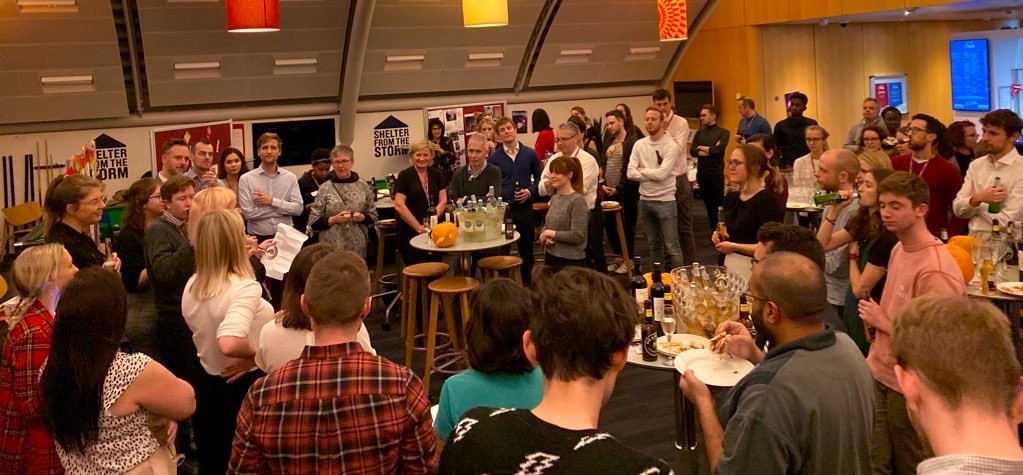
The magic of the network(s) effect
I’ve been writing quite a lot over the last few months about our work to develop a new strategy for Wellcome. A lot of this work can inevitably get a bit abstract and focussed on how we want to be in the future rather than how we are today, and I want to take a minute in this blog to write about an important part of Wellcome's story over the last few years, which has made us the organisation we are today.
We launched our diversity and inclusion programme as one of our 'priority areas' for Wellcome in 2017, deliberately placing it alongside other mission-driven priorities like anti-microbial resistance and epidemics to recognise the scale of change that we needed to support both across science and research, and within Wellcome. Of all of our programmes over the last 3 years, diversity and inclusion has done the most to change Wellcome; and the journey is still far from complete.
A central part of the programme has been to support Wellcome staff to reimagine and reinvigorate our networks – with very active Women of Wellcome, BAME, Disability Interest Groups, LGBTQI+ networks now moving at full speed, and Parents and Carers and Christians at work groups gathering increasing momentum alongside lots of further discussion about other potential future areas of interest (e.g. on interfaith activity).
My colleague Farrah Nazir last week wrote a great blog setting out the top 3 lessons she learned from 2 years chairing our BAME network- if you’re reading this and stepping into such a role, I’d strongly recommend having a look at Farrah’s advice.
Watching the networks take off over the last couple of years (and participating in LGBTQI+ as a staff member), I’ve been struck by the degree to which the networks have influenced both the culture and working environment of Wellcome and our broader mission and organisational strategy. We’ve hugely benefitted from the insight of the lived experience of our staff members in the shaping of a new transitioning at work policy, a set of really moving testimonies as part of menopause month, marched at Pride in greater number than ever before. But through the BAME network’s inspired move to flip Black History Month last year into a month of discussion about Black Futures and Afrofuturism (see picture above) re-framed our aspiration to shift the centre of gravity for research prioritisation and leadership to Africa in a really powerful way; and the LGBTQI+ network staff-led history walking tours of queer scientists in Bloomsbury has connected our work much more closely to our neighbourhood and local history.
The growth and energy from the networks has pushed our leadership further and faster on our own journeys of change than we initially felt able or comfortable – which has been an almost wholly positive thing. I remember at the start of the D+I programme we had a private conversation within our Executive team where we were asked to recount our “individual experiences of feeling excluded”, as a way to build common experience and energy behind the D+I agenda – for me this was one of the most moving and team-strengthening moments that we have had as an Executive team while I’ve been part of it. This and subsequent activity such as Reverse Diverse Mentoring, has been a powerful learning experience for our leadership and has given us an increasing range of tools and confidence – for example, last Autumn my colleague Chonnettia wrote brilliantly about how ‘being different is your super power’, and last week our CTO James posted one of the most read and commented-on Intranet posts of recent times, on his experience of identifying for the first time recently as a disabled member of staff.
At the heart of the network’s success has been a commitment to both allyship and intersectionality, with a regular pizza-fuelled allies evening and increasing array of events bringing different networks together (this week a talk on being queer in the Church of England). To that end, I was both honoured and a bit surprised to be asked by our Parents and Carers network to be their senior sponsor within Wellcome. At this time of my life I’m neither a Parent or Carer so the depth of my own experience is pretty limited, but I’ve learned a huge amount (most recently in the work we did to look at a Four Day Week) from those with complex responsibilities outside Wellcome from how they manage their time and priorities at work. While we’re making progress on improving support for flexible working around Wellcome, there’s further to go – for example, we have very few job-share partnerships in our organisation, and having done one myself for a year, I’d be really keen to support a discussion about whether and how this approach might work for more people at Wellcome.
The staff networks’ fantastic work has provided a incredible energy and purpose to both our D+I programme and wider mission – for example, pushing us to go further with the accessibility of our Collection, deeper on research culture, and has increased the pressure on us to go further and faster to make Wellcome a more inclusive place to work. At times it’s been an uncomfortable and slightly anarchic journey – but it’s one that is making us, step by step, a far better organisation.


